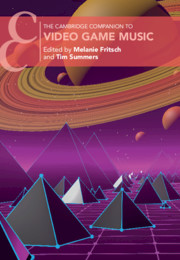Book contents
- The Cambridge Companion to Video Game Music
- Cambridge Companions to Music
- The Cambridge Companion to Video Game Music
- Copyright page
- Contents
- Figures
- Tables
- Musical Examples
- Contributors
- Preface
- A Landmark Timeline of Video Game Music
- Foreword: The Collaborative Art of Game Music
- Introduction
- Part I Chiptunes
- Part II Creating and Programming Game Music
- Part III Analytical Approaches to Video Game Music
- Part IV Realities, Perception and Psychology
- Part V Game Music, Contexts and Identities
- 18 Game Music and Identity
- 19 Game Music and History
- 20 Open Worlds: Globalization, Localization and Video Game Music
- 21 Female Credit: Excavating Recognition for the Capcom Sound Team
- Part VI Beyond the Game
- 24 Producing Game Music Concerts
- Select Bibliography
- Index
19 - Game Music and History
from Part V - Game Music, Contexts and Identities
Published online by Cambridge University Press: 15 April 2021
- The Cambridge Companion to Video Game Music
- Cambridge Companions to Music
- The Cambridge Companion to Video Game Music
- Copyright page
- Contents
- Figures
- Tables
- Musical Examples
- Contributors
- Preface
- A Landmark Timeline of Video Game Music
- Foreword: The Collaborative Art of Game Music
- Introduction
- Part I Chiptunes
- Part II Creating and Programming Game Music
- Part III Analytical Approaches to Video Game Music
- Part IV Realities, Perception and Psychology
- Part V Game Music, Contexts and Identities
- 18 Game Music and Identity
- 19 Game Music and History
- 20 Open Worlds: Globalization, Localization and Video Game Music
- 21 Female Credit: Excavating Recognition for the Capcom Sound Team
- Part VI Beyond the Game
- 24 Producing Game Music Concerts
- Select Bibliography
- Index
Summary
Video games have frequently been associated with newness, the present or even the future. Despite this, they have long had a close and creative relationship with history. While many early games dealt with ahistorical topics such as digital versions of already-extant analogue games (billiards, chess, tennis or ping-pong) or futuristic ideas such as Spacewar (1962), it was not long before games began to deal with history. Hamurabi (1968), for example, was one of the earliest strategy games, in which, through a text-based interface, the player acted as the ancient Babylonian king Hammurabi (c.1810–c.1750 bc) in the management of their kingdom.
- Type
- Chapter
- Information
- The Cambridge Companion to Video Game Music , pp. 343 - 358Publisher: Cambridge University PressPrint publication year: 2021
- 1
- Cited by

